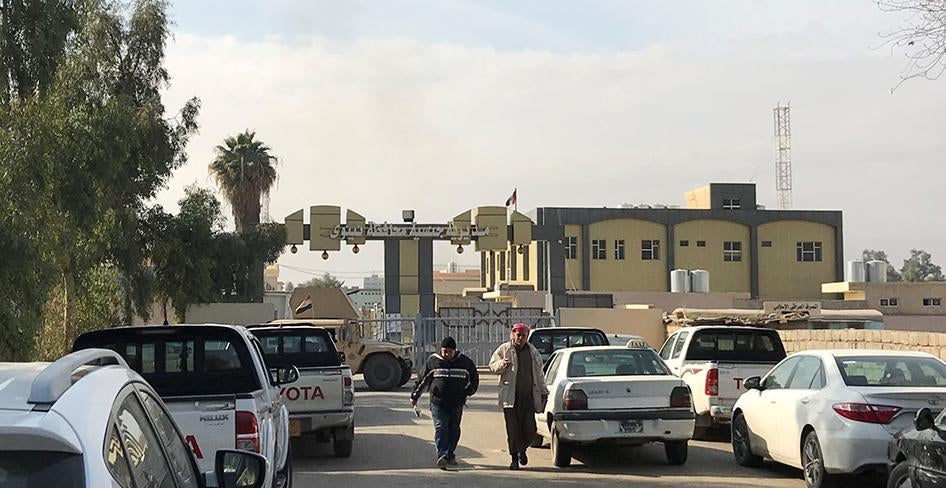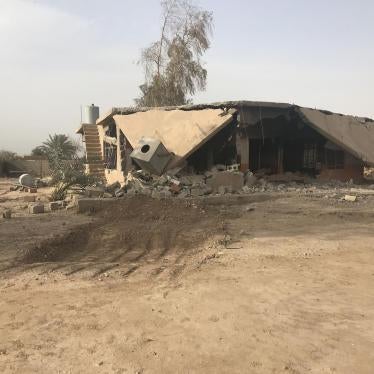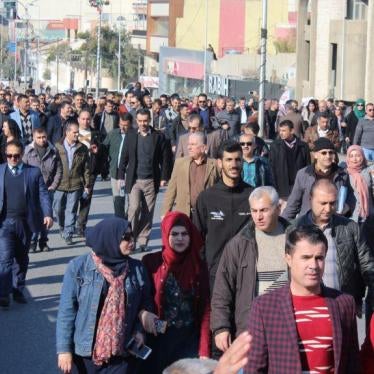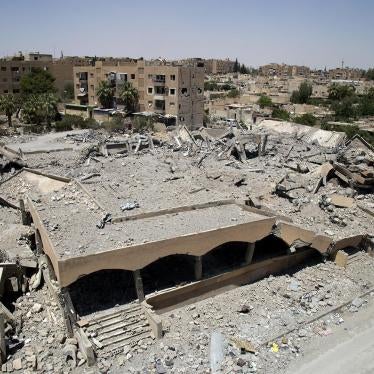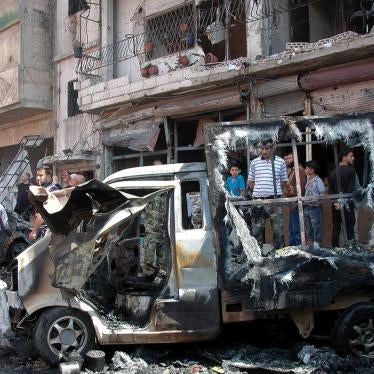(Beirut) – Iraqi security officers are routinely denying relatives of suspected Islamic State (also known as ISIS) members the security clearance needed to obtain identity cards and other documents, Human Rights Watch said today. Denying government benefits because of perceived family relationships instead of individual security determinations is a form of collective punishment prohibited under international human rights law.
Iraqis lacking full civil documentation can readily be deprived of their basic rights. They cannot freely move around for fear of arrest, nor can they get a job or apply for welfare benefits. Children denied birth certificates may be considered stateless and may not be allowed to enroll in school. Women unable to obtain death certificates for their spouses are unable to inherit property or remarry.
“Iraq’s security forces are marginalizing thousands of families of ISIS suspects by depriving them of the basic documents they need to rebuild their lives,” said Lama Fakih, deputy Middle East director at Human Rights Watch. “Unless this collective punishment stops, the authorities will be further destabilizing the situation in Mosul and other former ISIS-held cities.”
Since late January 2018, Human Rights Watch has interviewed 18 people in Mosul, including lawyers, aid workers, security officials, community leaders, a government representative, and a Mosul resident about the obstacles facing immediate relatives of suspected ISIS members. Human Rights Watch was unable to speak to any families directly, many of whom fled the city or were hiding, fearing attack.
Those interviewed said that a primary hurdle families of suspected ISIS members faced in integrating safely back into the community was their inability to obtain civil documentation, including birth, death, marriage and divorce certificates, identity and welfare cards, and passports. Obtaining these documents requires a security screening by Interior Ministry, Intelligence, or National Security Service (NSS) officers, and these families automatically fail the security screening because of their relatives’ suspected ISIS affiliation.
The absence of valid identity documents especially affects freedom of movement. Wathiq al-Hamdani, then Mosul’s police chief, told Human Rights Watch that moving around the city or anywhere in Iraq without valid IDs was extremely dangerous and put the person at risk of arrest. Families living in camps for displaced people were at times prevented from leaving the camps, even for medical treatment, because security forces required them to leave valid IDs in the camp to guarantee their return.
Nearly all families who lived under ISIS rule between 2014 and 2017 are missing one or more civil documents. ISIS authorities regularly confiscated official documentation and issued their own, which the Iraqi authorities do not recognize. In addition, state security forces confiscated some families’ documents as they fled fighting or arrived at camps for displaced people.
In November 2016, six families who had just fled ISIS control told Human Rights Watch that when they showed ISIS-issued documents to officials at a camp for displaced people, the officials refused to issue them new documents. The office of the United Nations High Commissioner for Refugees (UNHCR) reported that families living in camps may be unable to access basic humanitarian aid if they do not have civil documentation, including marriage certificates.
Iraqis seeking new or replacement civil documents need to first obtain an application form from a judge and take it to the Civil Status Directorate, where intelligence and National Security Service officers run a security check. If the applicant has an immediate relative whose name appears on a wanted list, the applicant automatically fails the security check and the application is denied.
Applicants from ISIS-controlled areas also faced security risks when they approached the Civil Status Directorate without a lawyer to help obtain the documents. The lawyers said they had witnessed intelligence officials arresting applicants in some cases, although they could not provide details regarding these arrests. A senior police chief in Mosul confirmed that security forces were arresting and interrogating these applicants and admitted that his officers often treated them “very badly,” even if the officers did not arrest them.
In some cases, women whose husbands died while living under ISIS control are presumed to have had an ISIS-affiliated husband and fail their security check, lawyers said. In a few cases, one lawyer said, children in their late teens – but not their parents – have been able to get the security clearance and obtain their documents. However, only children able to travel to court on their own could do this.
One lawyer said that when he took the mother of an ISIS fighter and the wife of an ISIS member and their son to the directorate to seek a security clearance, an intelligence officer threatened him, saying “Do not bring any cases like this again. What are you, an ISIS supporter?” Because of incidents such as this, lawyers said, lawyers were reluctant to assist people with a suspected ISIS relative, even children, who were seeking civil documentation, because of the risk they faced and to themselves and the likelihood that they would be refused.
The lawyers and government officials knew of no provision in Iraqi law that prevents these families from obtaining their civil documentation. Given this de facto prohibition, Iraq’s highest authorities, such as Prime Minister Haider al-Abadi’s office, would need to issue orders to remove the obstacles, the lawyers said.
Prime Minister al-Abadi and Interior Minister Qasim Mohammad Jalal al-Araji should state publicly that all Iraqi families have the legal right to obtain civil documentation regardless of relatives’ alleged affiliation with ISIS and should review internal intelligence procedures to remove existing obstacles.
The authorities should ensure that all staff working in Civil Status Directorate branches understand the law and the need not to discriminate. The Interior Ministry should send senior officials to monitor branches in former ISIS-controlled areas to ensure that security officers do not harass families. International protection agencies should consider enhanced monitoring of the treatment of these families.
“The Iraqi government has valid security concerns that ISIS members sought for serious crimes should not be able to get fake identity documents,” Fakih said. “But keeping women and children who did nothing wrong beyond having a relative join ISIS out of work, out of school, and in fear of arrest every day will do nothing to foster reconciliation in Iraq.”
Additional Obstacles
In addition to the de facto ban on security clearances, a number of other practical and legal obstacles prevent relatives of ISIS suspects in Iraq from obtaining civil documentation. Iraq’s chief justice should examine the court’s handling of these cases to improve accessibility and speed of the process.
The armed conflict in Iraq has resulted in a large number of deaths and missing people, creating hardships for families on both sides of the conflict and burdening the state bureaucracy.
Given the administrative turmoil resulting from the conflict, the Iraqi government should consider issuing temporary regulations that would streamline the process for issuing death and missing person certificates. The impartial implementation of the Personal Status Law (1959) would benefit all families affected by the war and allow for faster reintegration into Iraqi society. The judiciary could reduce delays, such as applying the minimum time period necessary for issuing paperwork after a spouse is declared missing, which is two years under the Juvenile Care Law (1980).
Marriage Certificates and Divorce
To obtain a marriage certificate both the man and the woman need to testify to the event, along with two witnesses, or one spouse needs to present the death certificate of the other, along with two witnesses, under the Birth and Death Registration Law (1971) and Civil Status Law (1972).
Women can seek a judicial divorce in certain cases laid out in Iraq’s Personal Status Law, such as if their husbands have been absent for two or more years, imprisoned for three or more, or declared missing for four or more. Given the country’s current situation, the Iraqi government should consider passing legislation or issuing regulations that would expedite judicial divorces or permit unilateral terminations of marriage for women whose husbands are missing or are presumed to have died in the conflict with ISIS.
Women whose husbands are dead or missing but who cannot obtain their own identification documents may be unable to get humanitarian aid because identification documents needed to receive aid are issued in the name of the male head of household. The government should issue regulations to allow for alternative forms of documentation. Mothers should be able to obtain birth certificates for their children without requiring them to present the father or proof of the father’s death, and regardless of any perceived ISIS affiliation of members of the family.
The United Nations Committee on the Elimination of Discrimination against Women (CEDAW), in its General Recommendation No. 30 on women in conflict, states that governments should “[g]uarantee conflict-affected women and girls equal rights to obtain documents necessary for the exercise of their legal rights and the right to have such documentation issued in their own names, and ensure the prompt issuance or replacement of documents without imposing unreasonable conditions.” Governments should also “ensure the timely and equal registration of all births, marriages and divorces.”
Birth Certificates
Under the Birth and Death Registration Law, parents in Iraq can only obtain birth certificates for babies born in wedlock. If a woman married a man in an area under ISIS control and gave birth to a child in an ISIS-run hospital, Iraqi authorities generally will not accept the ISIS-issued marriage and birth certificates. Since the beginning of the year, at least one judge in Mosul has accepted ISIS-issued birth certifications and reissued new ones if the family passes its security screening, lawyers said.
To obtain a new birth certificate for births outside of a hospital, both parents need to testify to the event or one parent, usually the mother, needs to present a marriage and death certificate for the spouse. In cases in which the father is now dead and the mother cannot obtain the marriage and death certificate, the woman cannot obtain a birth certificate or identity card for her child. Without a birth certificate, the child cannot obtain an ID card or any other documentation. The child cannot enroll in school without an ID card, numerous teachers, principals, and lawyers across Iraq have told Human Rights Watch in interviews. Civil documentation is also necessary for children to apply for work in the public sector, education and other public services, and obtain travel documents.
These obstacles are affecting many families in former ISIS-controlled areas. A woman at a camp in Tikrit said that she married in 2012 but never updated her identity card to reflect that. Her husband joined ISIS when it controlled the area where the family lived, and the couple had a child. “My husband is dead, but in order to get my son a birth certificate, I need [to] present [my husband’s] death certificate,” she said. “I just can’t do any of that, I told the judge. All he said was, ‘It’s not in my hands.’ I am scared my son will never be able to go to school, and I just don’t know what will happen to us.”
In some cases, women married to alleged ISIS members have been unable to obtain birth certificates for their children born in government-controlled areas. A woman from west Mosul said she had five friends with missing or dead husbands who had joined ISIS after getting married. The wives had given birth in recent months but were afraid to give the father’s name at the hospital because he was a known ISIS member. None of the women were able to get a birth certificate for their babies, she said.
Death Certificates
Women face hurdles in obtaining the death certificates for deceased alleged ISIS-affiliated husbands, which are required to obtain birth certificates for children or to allow the women to marry again.
Under Iraq’s Personal Status Law, Juvenile Care Law, and Civil Status Law, if no body has been found, the relative needs to file a claim to get a death certificate. An investigative judge then opens a file, and the relative needs to get intelligence or National Security Service officers to stamp the file.
The relative can then publish an announcement in an official newspaper, asking anyone with information about the whereabouts of the body to come forward. If no one comes forward within four years, the judge will issue the death certificate. Iraq’s Personal Status Law provides that the court can terminate a marriage four years after the husband has been officially declared missing by the court.
The Juvenile Care Law allows judges to reduce the time the person has been missing to two years in exceptional circumstances, including times of conflict. However, the lawyers interviewed knew of no cases in which judges reduced the time period, with judges contending that the applicants could not prove that the person disappeared in a conflict area.
Three lawyers in Mosul said that in cases of suspected ISIS members, judges often refuse to open the initial file, questioning the wife or other relative about the person’s possible whereabouts. One lawyer said he comes across about five cases a day in which women try to terminate a marriage to a deceased husband and the judges reject all of their requests.
Even if the judge agreed to open the file, it would be unlikely that the relative could get permission to publish the search announcement. Without a death certificate, a woman cannot remarry and she and her children cannot inherit her husband’s property.
